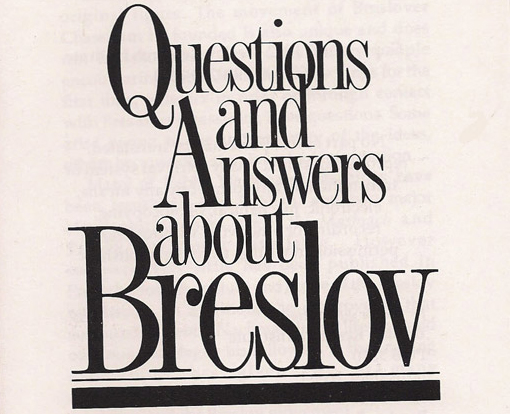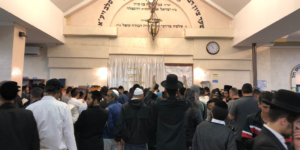- Ask the Rabbi ⬦ History ⬦ Uman
Ask A Breslover: How to Learn Likutey Moharan
When learning Likutey Moharan for the first tune, I feel like a kid trying to drink whiskey?
I understand your feeling. Many people feel overwhelmed by Likutey Moharan; by the unique structure of its lessons, etc., and come to the unfortunate conclusion that Likutey Moharan is a closed book for the average person. However, experience has shown that with just a little guidance, Likutey Moharan can become a totally open book for almost anyone. Of course, each person will understand it on his level and according to his own way of perceiving things, but in general most people will be able to find encouragement and guidance in their own personal way.
As a side note, it’s important to point out that most teachers of Breslov don’t recommend starting to study and understand Breslov with Likutey Moharan. It would be better to first study the shorter, easier books which are: (1) Sichos HaRan (translated as Rabbi Nachman’s Wisdom) which contains most of the central ideas of Breslov in a simple, straightforward manner, (2) Hishtaphut HaNefesh (Outpouring of the Soul), which details and guides us in the practice of Hisbodedus, (3) Meshivat Nefesh (Restore my Soul), which presents the Rebbe’s teachings regarding constantly encouraging ourselves, to never give up and to keep on starting again from scratch, even a thousand times in one day, (4) Kitzur Likutey Moharan, which presents most of the ideas in LKM in a straightforward, simple way. In addition, it may help you to listen to the recorded lectures of modern-day Breslov Rabbanim, or books written by them, and (5) Alim LeTrufah, letters from Reb Nosson to his children and students (an abridged addition translated as Healing Leaves).
After we have already acquired an overall picture of what Breslov is supposed to be and in what direction it’s supposed to be leading us, it becomes much easier for us to understand the context of LKM and direction which the Rebbe is trying to take us through his primary lessons.
Back to learning Likutey Moharan: First of all, the Rebbe in Chayei Moharan recommends that we have two different study sessions in LKM, one to study through the entire book at a very quick pace and a second one to study it in depth. During the session meant for learning quickly, there are many Breslover Chassidim who just recite the text, even without understanding it. Experience has shown that just by repeating over the entire text of LKM several times, within a short time people begin to pick up on the unique structure and terminology of the Rebbe, and when it comes to their in-depth study session, they find themselves well prepared to begin understanding LKM.
When it comes to actually trying to understand LKM, which is the second study session mentioned before, it is important to point out that this is a very individual experience. Every person really has his own way into LKM, and although general guidance is of course beneficial and necessary, after you know the direction in which you are headed you really have to take the actual journey yourself.
Throughout your journey, take time every day to talk to Hashem in your own words about what you are going through. This means that every idea which you come to understand in LKM should be discussed with Hashem. Constantly ask Him to help you understand how it pertains to you in your own situation.
Read a small piece of LKM, maybe a sentence or two, and try to feel for yourself, what feeling do I get from the words I’m reading? It’s important that you focus on what you feel the Rebbe is telling you, specifically, in your own personal situation. Keep in mind that the Rebbe is talking to you, as an individual, and is not just throwing around abstract, mystical ideas or lofty concepts in Avodas Hashem. Try to understand whatever you’re reading in that context.
Ignore for the time being anything which you find confusing, whatever it might be, if it’s the structure of the various proofs which the Rebbe brings or how this idea fits into the context of the rest of the discourse, or anything else which takes you away from simply trying to understand and feel what the Rebbe is saying to you.
Let me repeat: Ignore anything you are reading which makes you feel that this is a difficult book, etc, or that you can’t understand. Whenever you feel that something is making you feel like that, put that thing aside, make a little notation on the margin, and come back to it later when you feel that you have the proper tools to deal with it.
Now take whatever you do understand, whatever feeling and idea you got out of what you’ve just read, and hold it up against everything you know from Sichos Haran, Meshivat Nefesh, and the other books mentioned above. Does your understanding of this piece of LKM seem to conform to the positive direction which you have gleaned from those books? If not, then let’s try again to understand what the Rebbe is saying. If it does, then you have what to make a prayer out of, and you can continue reading further.
As you proceed, and especially when you go over the lesson again, you will begin to see how each lesson really contains many interconnected ideas. It pays to start taking note of them, making lists of how each concept is connected to the other ideas presented in that lesson. What will you gain? As you will have seen by now, the Rebbe seems to say obscure, abstract ideas at the beginning of a lesson, or the point of a particular sentence or Biblical or Talmudic or Zoharic quote is not always understood. When you see the connections within the lesson itself, you begin to understand how the Rebbe really does explain himself throughout the lesson. We just have to make the connection from the various parts of the lesson.
With that in mind, you begin to study the lesson again and you start seeing and understanding more concepts and ideas. Again, there will still be things which you find confusing- ignore them for now.
At a later stage, you can look up the quotes that the Rebbe brings, or you can find other Chassidic works or the Zohar which discuss the same ideas which you are studying in that particular lesson. They may help you to better appreciate and understand what the Rebbe is saying.
- 3 comments




















3 Responses
This is very good advice!
I spent many years frustrated learning Likutey Moharan and understanding very little. Putting it aside and learning Sichos HaRan and Kitzur Likutey Moharan helped me tremendously so that I could get the “macro” view of this sefer.
However, what helped me the most was going to Uman last year for the first time. Likutey Moharan opened up to me and now I can really sense the great light within in.
When I learn Likutey Moharan now, I learn each Torah three times slowly (this may take a few months). After the third time, I feel like I have a better grasp of the concepts and ideas Rebbe Nachman is presenting. I then learn the accompanying Likutey Halachos pieces as well as saying the accompanying tefillah from Likutey Tefillos.
Bottom line, if you really want to learn Likutey Moharan you need to go to Uman. Many people told me that this was the case beforehand, but after having gone, I now believe it completely!
Are you coming back this year? Perhaps you could write your experience down for everyone?
Believe me, I think about it everyday….